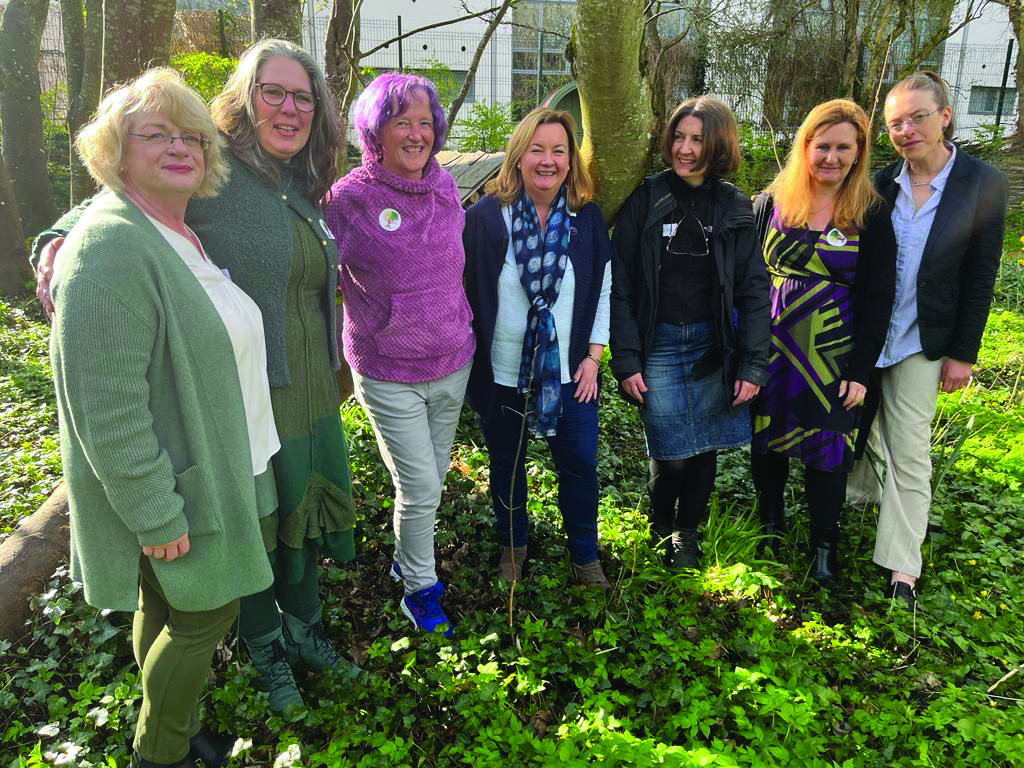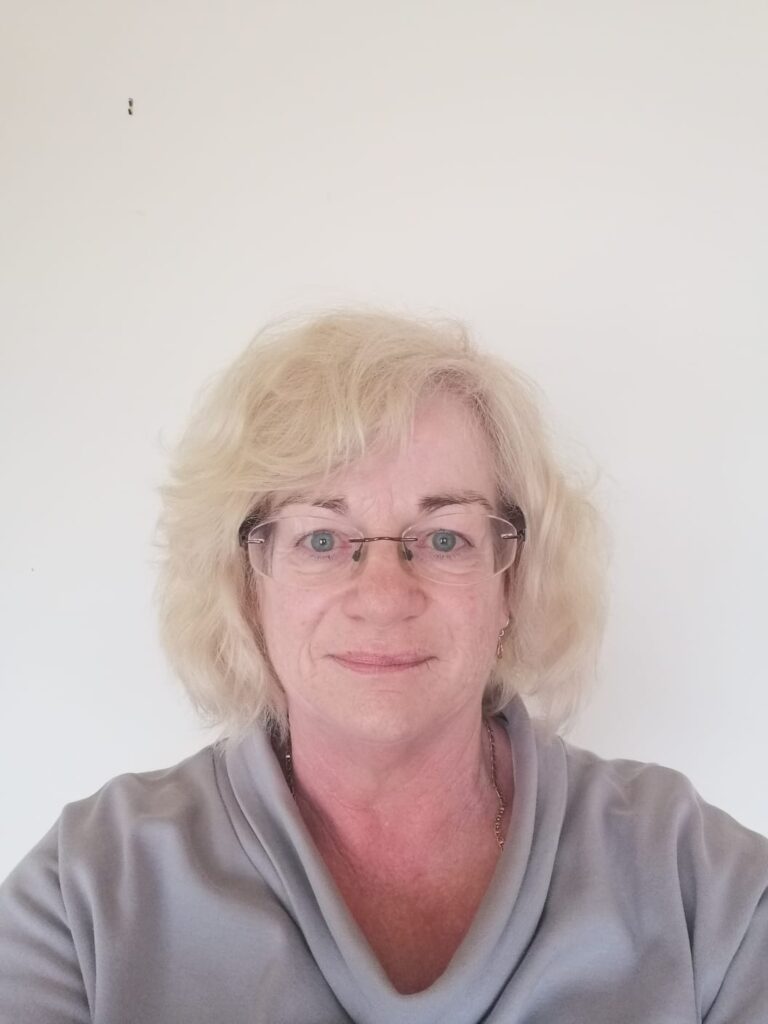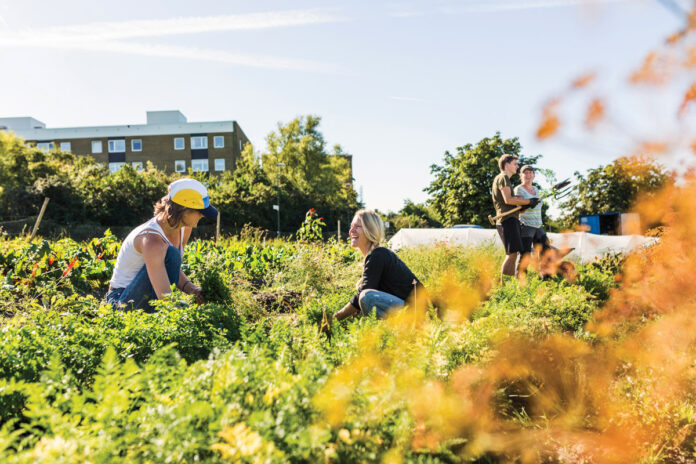Social therapeutic horticulture is the process of using gardens, allotments, plants and plant materials to improve mental and physical health. Part of the role that the recently-formed Association of Social Therapeutic Horticulture Facilitators of Ireland (ASTHFI) plays is to bring awareness to local communities about what social therapeutic horticulture (STH) facilitators can offer.
Social therapeutic horticulture enables participants to understand themselves, achieve goals, and connect and engage with others and the environment. It also stimulates feelings of safety, being valued and having a sense of belonging. The goal of STH is to maximise social, cognitive, physical and mental well-being.
In STH activities, participants work and connect through the medium of nature, plants and plant material. By using all their available senses, the participants become more aware of nature in connection to themselves and their environment, regardless of their age, abilities and life phase.
STH facilitators see firsthand how gardening, working with plants and experiencing the rhythm of the seasons, benefits individuals and groups working in various STH programmes. Nature is the perfect environment to engage with one’s senses and experience the flow of nature’s lifecycle.
By exploring the natural environment, you can see, feel, hear, smell and even taste the elements that nature provides. People can relate to their own life when looking at the lifecycle that nature represents. Nature is an excellent metaphor for many themes like meaning, loss, growth, change, resilience, communication, connecting, transformation and hope.
FORMATION OF ASTHFI
A meeting of minds took place in 2021 when members of the ASTHFI management committee were studying STH at Festina Lente in Bray, Co Wicklow. They discovered during their studies that there was no existing association of STH facilitators in Ireland. Recognising the potential value that such a service could bring to Irish STH facilitators, they held their first meeting via zoom on 22 March, 2022, and the Association of Social Therapeutic Horticulture Facilitators in Ireland was formed.
The group was encouraged by Dr Sinéad O’Connor, who was the tutor on the STH course in Festina Lente, and has since become the ASTHFI’s president. The management group hosted an open afternoon in Festina Lente in July 2022 to gauge interest in the association. Following that, a seminar was held in September 2022. Organised by Dr O’Connor, this brought together speakers and activists from the world of STH.
The work became serious, with the management committee discussing safety for both facilitators and service users; and so ASTHFI set about becoming a ‘relevant organisation’, which was achieved in early 2023. ASTHFI are now able to offer registered members garda vetting as an STH facilitator. The association has written policies, including child safeguarding policy, safety statements, code of ethics, GDPR policy, GDPR consent form, constitution, core values and a mission statement. All of these are available on the website in the members-only portion for members to adapt to their own practice.
In March 2023, ASTHFI held its official launch in McAuley Place in Naas, Co Kildare. The event included speakers Roisin Markham, a business leader, systems thinker and relational designer with over 20 years experience; Rachel Freedman, a full-time lecturer in horticulture with 25 years experience in both the further and higher education sectors; and Dr Jill Carrey, Ireland’s first PhD holder in equine assisted learning for youths at risk. She is CEO of the charity Festina Lente in Bray, Co Wicklow.
THE WORK OF ASTHFI
ASTHFI’S membership criteria strives to be as inclusive as possible, recognising that some facilitators have been working in STH for years without formal qualifications. ASTHFI provides a supportive community for all members.
On a practical level, the association provides members with evidence-based resources, advice, and opportunities to strengthen and grow their practice, ultimately helping them to provide the best support for their service users and clients. This is achieved through the website with its ‘members only’ resource area, and through members’ monthly zooms, where ASTHFI introduces guest speakers and discusses community practice. Registered members are offered space on the website to promote their own private practice. ASTHFI can help facilitators design their own websites, or can include a link if they have existing websites. They then become part of ASTHFI’s interactive digital all Ireland map.
In the short time since ASTHFI was established, they have made connections with many different organisations in the fields of mental and physical health. Three of the management committee did a podcast with Dr Sean Owens from Doctors for the Environment about encouraging GPs to think about STH for their patients.
An ASTHFI committee member and myself (as current ASTHFI chair), sit on Mental Health Ireland’s ‘co-production nature group’, which is working on a pilot program to introduce STH activities as an add-on to the 12-week forest walk program currently being offered around Ireland by local mental health groups. Two ASTHFI members’ work gardens are now registered with Community Gardens Ireland (CGI) and are on the CGI website. 15 members of the Chartered Institute of Horticulture visited my garden in Mayo, where the group learnt about STH and took part in some STH sessions. ASTHFI are looking forward to working with the Chartered Institute on future projects.
FIRST AGM AND OPEN DAY
Last March, ASTHFI members and the general public came together in McAuley Place in Naas. Speakers included well-known traditional herbalist Séan Boylan from Co Meath. The art and science of traditional herbalists within the Boylan family can be traced as far back as the 15th century. Each generation has fostered the knowledge of their ancestors, but adapted successfully to the needs of the clients in the times they live in.
The next speaker was Prof Lizbeth Goodman, chair of creative technology innovation and full professor of inclusive design for education at University College Dublin, where she directs the Inclusive Design Research Centre of Ireland, in partnership with SMARTlab and Academy 4 the Future.
The last speaker was Niall O’Brien from Dublin, whose interest in hydroponics and aquaponics led to the creation of a social enterprise called the Grow Dome Project. The project has won many local and national awards for its social impact, and is slowly expanding across Dublin with a third project for 2024.
In the afternoon there were a variety of workshops facilitated by members of the management committee, including a ‘group work lab’ on how to use the GROW method when writing STH sessions; and a session on ‘how regular supervision makes practice safer’.
The association provides members with evidence-based resources, advice, and opportunities to strengthen and grow their practice

THE ASTHFI MANAGEMENT COMMITTEE
The management committee come from a wide variety of backgrounds, including landscape design, adult education, the sexual violence sector, special needs assistance, psychotherapy, nursing and coaching. The members all have a passion for empowering others through the medium of nature, and are aware of the need for models of best practice for STH facilitators in Ireland.
President Dr Sinéad O’Connor is an associate lecturer in environmental management and sustainability in Open University. She is head of horticulture and sustainability services in Festina Lente Victoria Walled Garden, where the group all studied, and is a mentor and trainer in QQI Social Therapeutic Horticulture Facilitation.
I’m the current chair of the committee. My own background is in supporting people who’ve experienced sexual violence, and I’m also a foster carer.
Edith Gordon delivers life and work coaching, therapy, and training for individuals and corporations to help them develop a resilient lifestyle or workstyle, in combination with STH.
Elaine Dunwoody has worked as a special needs assistant in second-level education for ten years.
Founding member Tanya O’Brien has over thirty years’ horticultural experience, having graduated from the Botanic Gardens in 1990.
Mary Marsden has a passion for nature and is an advocate for allotment gardening.
Aoife Clavin has experience in STH that involves working as an adult education tutor with groups in various settings such as mental health recovery, young adults, intellectual disability and community groups.
There are many more STH facilitators who are ASTHFI members around Ireland. They can be found on the association’s website: www.asthfi.ie, where visitors will also learn more about the benefits of STH. ✽
 NICOLA ROWNTREE-CARROLL, the chairperson of ASTHFI, is a social therapeutic horticulture facilitator working within the fostering community.
NICOLA ROWNTREE-CARROLL, the chairperson of ASTHFI, is a social therapeutic horticulture facilitator working within the fostering community.






